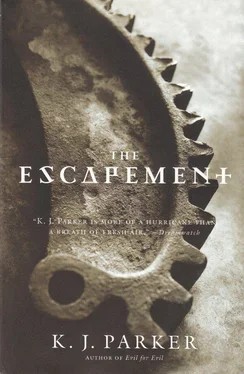K Parker - The Escapement
Здесь есть возможность читать онлайн «K Parker - The Escapement» весь текст электронной книги совершенно бесплатно (целиком полную версию без сокращений). В некоторых случаях можно слушать аудио, скачать через торрент в формате fb2 и присутствует краткое содержание. Жанр: Фэнтези, на английском языке. Описание произведения, (предисловие) а так же отзывы посетителей доступны на портале библиотеки ЛибКат.
- Название:The Escapement
- Автор:
- Жанр:
- Год:неизвестен
- ISBN:нет данных
- Рейтинг книги:4 / 5. Голосов: 1
-
Избранное:Добавить в избранное
- Отзывы:
-
Ваша оценка:
- 80
- 1
- 2
- 3
- 4
- 5
The Escapement: краткое содержание, описание и аннотация
Предлагаем к чтению аннотацию, описание, краткое содержание или предисловие (зависит от того, что написал сам автор книги «The Escapement»). Если вы не нашли необходимую информацию о книге — напишите в комментариях, мы постараемся отыскать её.
The Escapement — читать онлайн бесплатно полную книгу (весь текст) целиком
Ниже представлен текст книги, разбитый по страницам. Система сохранения места последней прочитанной страницы, позволяет с удобством читать онлайн бесплатно книгу «The Escapement», без необходимости каждый раз заново искать на чём Вы остановились. Поставьте закладку, и сможете в любой момент перейти на страницу, на которой закончили чтение.
Интервал:
Закладка:
While the announcement was being read out, Duke Miel married some woman nobody had ever heard of, in a perfunctory ceremony conducted by a clerk, promoted to the rank of chief registrar of Eremia for the occasion. The few people who witnessed the ceremony said afterwards that they found the whole business too bizarre to understand. The bride was neither young nor beautiful; in fact, her face was quite hideous because of a scar and a broken nose and jaw that hadn't been properly set. As for her rank and birth, she was nobody at all, the widow of some provincial squire. Afterwards there was no reception, no speeches, no scattering of coins or conspicuous donations of food to the poor (true, there weren't any poor to be found, unless you counted soldiers and camp followers, but it was the look of the thing), and the happy couple walked away unescorted, not even holding hands. It was unworthy of the Ducas, they said, and an insult to the Eremian people, who deserved a little pageantry and splendour to raise their morale after the misery of the war and the occupation.
The new duke's first official act was widely regarded as equally ill-omened. Instead of announcing measures to alleviate conditions for the refugees, or plans to rebuild Civitas Eremiae, or any of the things that were expected of him, Duke Miel chose to inaugurate his reign by granting a monopoly in perpetuity for the manufacture and sale of fine porcelain, along with a grant of land in the mountains somewhere, to some minor nobleman called Framain. No explanation was given, a further proof of arrogance. People with long memories seemed to recall rumours of some kind of liaison between the duke and Framain's daughter. Later it emerged that Framain had been General Daurenja's business partner, and this went some way towards reconciling popular opinion; Daurenja, already much admired by the Eremian people during his lifetime, had won a lasting place in their hearts by his heroic death (if only he'd survived, they said, we'd have taken the City and lived like princes on the spoils for the rest of our lives). Even so, as many influential figures pointed out, it was a most unhealthy precedent. None of the duke's predecessors had ever granted monopolies. Power had clearly gone to his head; hardly surprising, given his family history, and what had the Ducas ever done for the ordinary people? "They're in there," Psellus said.
"Thank you," Ziani replied. He'd known, without having to be told.
Psellus hesitated. "I imagine you'd like me to go now."
"Yes."
"Of course. Will you see me again before you leave?"
Ziani shook his head. "I don't think so," he said. "I was planning to slip away as quietly as possible. I don't suppose it'll take them long to realise their commander-in-chief has gone absent without leave, and in the circumstances I'd be grateful for as much of a head start as I can get."
Psellus nodded, but he seemed reluctant to move. "What about money?" he said. "You'll need some for your journey, and-"
"Taken care of." Ziani cut him off short. "They can add embezzlement of public funds to the list of charges at my court martial. Now, if you'll excuse me."
Psellus took a step away, and saw Ziani put his hand to the latch again; he reached out and caught his wrist. "Are you sure this is a good idea?" he said. "You know what she did to you…"
Ziani took his fingers and prised them gently apart. "My daughter hasn't done anything to anybody," he said, "and I love her very much. And she loves her mother. That's a good enough reason on its own."
Psellus nodded. "That's an eminently reasonable justification," he said. "But it's only half the truth. Less than half, quite possibly."
"Goodbye, Chairman," Ziani said. "And thank you. You're a good man."
"No," Psellus said, and walked away.
Well, Ziani thought, and he pressed the thumbplate of the latch. Then he turned round quickly and called out, "Psellus."
Psellus turned slowly. "Yes?"
"Down there, in the main hall," Ziani said. "Those paintings on the wall. They're…" He struggled for the word. "Allegories," he said. "For the ideals of the Guilds, Specification and things like that."
"That's right," Psellus said.
Ziani nodded. "Then why have they all got white faces?"
Psellus smiled. "It's an old artistic convention," he said. "Many years ago, the walls of public buildings were decorated with carved marble reliefs. Fashions changed, or it was too expensive. But the painters made everybody white to look like marble carvings."
"I see." Ziani dipped his head in acknowledgement. "Thanks. I don't know why, but it seemed important. It'd have bothered me to death if I'd gone away without knowing."
Psellus walked away, and this time no voice called him back, which was just as well. He respected Ziani's intelligence, at least, and it wouldn't be long before it occurred to him to wonder why, if the faces and skins were white to represent marble, the clothes and the objects they held were in colour. He pressed the latch and pushed the door open.
They were sitting by the window. Moritsa was holding a book, and she was leaning over her shoulder, pointing at the page. She was teaching her to read.
"Hello," Ziani said.
She looked up; and Moritsa dropped the book, screamed, looked at him, and ran across the room to hug him. He stayed still for a few seconds, letting her hold him, then gently moved her away. He walked past her to the window, picked the book up and gave it to her.
"Just go outside and look at your book for a minute, honey," he said. "I need to talk to Mummy."
Moritsa looked up at him, then went through the door. He heard the latch snick.
"Is she my daughter?" he asked.
"No," she replied.
"His?"
"You mean Boioannes? No. That was much later."
Ziani nodded. "It doesn't matter," he said.
"Falier," she said. "I'd been seeing him for a long time before Maris came along."
"I see." Her eyes were fixed on him. "Falier's dead, by the way," he said. "He was killed on the embankment."
"Oh," she said.
"I've taken care of Boioannes," he went on (and he watched how she reacted to the ambiguity; just a flicker of the eyes). "I had him sent away. He'll be safe there now, and well provided for." He waited, then smiled. "You were worried for him," he said. "You thought I'd have him killed."
"Yes."
He shook his head. "I'm not a savage," he said. "You don't know me very well if you think I'd do something like that."
"I'm sorry," she said.
"It's all right."
"It was all his fault," she said. "Boioannes. He-"
Ziani raised his hand. "I know," he said. "He fell in love with you, or got obsessed with you, and you didn't dare send him away because he was so powerful. Then it all got out of hand; he forced you to help him get rid of me, with the mechanical doll. That's right, isn't it?"
Her eyes were wide, round, wary, closed, like a fencer watching his opponent, trying to read his next move. "That's right," she said. "He made me do it all, and I was so scared. He said he'd hurt Moritsa if I didn't do as I was told."
He admired her for that, even though he was pretty sure it was a lie. It was strong enough to be the foundation for a reconciliation, and Boioannes could never deny it, not now. "He used you, you know," he said. "He didn't really love you; or if he did, it wasn't the real reason he wanted you. I found out the truth-well, Chairman Psellus…"
"Oh," she said. "Him."
He couldn't allow himself to smile, but that brief cold glare was priceless. "He investigated the whole thing," he said, "which is how I know you're telling the truth." (She hadn't expected that; but she hid it well.) "Boioannes wanted power; he was the chairman of Necessary Evil, but in peacetime it isn't the same. It's only when there's a war on that the chairman has the power to run the City all by himself. Boioannes wanted a war that'd last a long time. It nearly went wrong when the Eremians attacked us and we wiped out their army in a few minutes; he knew that'd happen, which is why he had to go to such extreme lengths. He wanted the sort of war where we'd have to attack them, rather than just defending ourselves; he figured that the only way he'd get that was if someone broke the most sacred rule and defected to another country with Guild secrets. I was the perfect choice. I knew enough to do what I eventually did, but I was unimportant enough not to be able to defend myself or fight back when he framed me. Falier must've been in on it too. They fixed it so I'd have an opportunity to escape-I nearly screwed it up-and after that, it all worked out just how he wanted it to, except he never imagined I'd find a way to bring the savages into the war. But you can't really fault him there. He had no reason to believe I'd be so resourceful. But of course, he was never really in love with you, not the way I was. That meant he couldn't hope to understand me. Anyway," Ziani went on, moving a little nearer, like a fencer closing the distance (coming close enough to hit and be hit; you can never attack without making yourself vulnerable), "let's forget all about him now. I've sorted him out and put everything right, so we can start all over again, just the three of us." He paused, then added, "If that's what you want."
Читать дальшеИнтервал:
Закладка:
Похожие книги на «The Escapement»
Представляем Вашему вниманию похожие книги на «The Escapement» списком для выбора. Мы отобрали схожую по названию и смыслу литературу в надежде предоставить читателям больше вариантов отыскать новые, интересные, ещё непрочитанные произведения.
Обсуждение, отзывы о книге «The Escapement» и просто собственные мнения читателей. Оставьте ваши комментарии, напишите, что Вы думаете о произведении, его смысле или главных героях. Укажите что конкретно понравилось, а что нет, и почему Вы так считаете.












